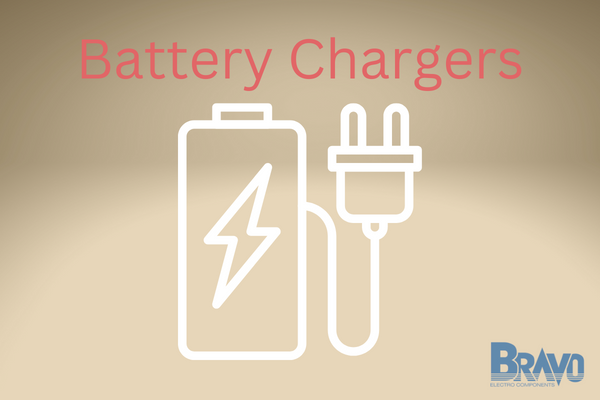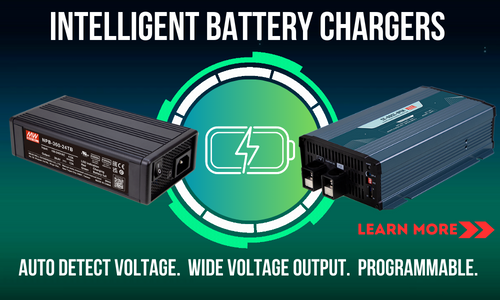
Both lead-acid and lithium-ion battery chargers are available at Bravo Electro, but what's the difference between the two? And which one is better for your specific needs?
In this post, we will explore the topic of lead-acid battery chargers vs lithium-ion in detail and help you determine which one is best for your application.
Lead Acid Battery Charger vs Lithium Ion Battery Charger: What is the Difference?
Choosing the right battery charger is essential for ensuring that your battery lasts as long as possible and performs at its best. Two of the most common types of battery chargers available in the market are lead acid battery chargers and lithium-ion battery chargers.
In this section, we will explore the key differences between lead-acid and lithium-ion battery chargers, and help you determine which one is best for your application. We’ll also touch on lead-acid batteries vs lithium-ion since lead-acid batteries vs lithium-ion have seen some recent debate.
What is a Lead Acid Battery Charger?
Lead acid battery chargers are devices specifically designed to charge and maintain lead acid batteries, which are commonly used in applications such as cars, boats, and backup power systems. They are relatively inexpensive, durable, and have a relatively long lifespan. However, they can be heavy and bulky and require regular maintenance such as topping off the water levels.
Lead acid battery chargers typically deliver a constant voltage charge and have a built-in thermal sensor to detect overheating. They are also typically less expensive than lithium-ion battery chargers and are used in modular power supplies, but are not as efficient, may take longer to charge, and have a shorter shelf life.
What is a Lithium Ion Battery Charger?
Lithium-ion battery chargers, on the other hand, are devices designed to charge and maintain lithium-ion batteries, which are a newer technology that has gained popularity in recent years. They are much lighter and smaller than lead-acid batteries and have a longer shelf life.
However, they can be more expensive and have a shorter lifespan. Lithium-ion battery chargers typically deliver a constant current and constant voltage charge and have built-in protection against overcharging and overheating.
Overall, when it comes to a lithium-ion battery vs lead acid, most people would say that lithium-ion comes out on top. However, don’t count lead-acid out of the fight yet. This next section will dive deeper into the differences between a lithium-ion battery vs lead acid.
Lithium Ion vs Lead Acid Battery Chargers: Differences Explained
Now that we understand lithium-ion batteries vs lead acid, when it comes to comparing lithium-ion and lead-acid battery chargers, there are several key differences to consider.
One of the most obvious differences is the type of battery each charger is designed to charge. Lead acid battery chargers are specifically designed to charge and maintain lead acid batteries, while lithium-ion battery chargers are designed to charge and maintain lithium-ion batteries.
Another important difference is the charging method. Lead acid battery chargers typically deliver a constant voltage charge, while lithium-ion battery chargers typically deliver a constant current and constant voltage charge. This means that lithium-ion battery chargers are more efficient and can charge faster than lead-acid battery chargers.
In terms of safety, lithium-ion battery chargers often have built-in protection against overcharging and overheating, while lead-acid battery chargers typically have a built-in thermal sensor to detect overheating.
Additionally, Lithium-ion battery chargers are UL listed, meaning that they have met safety standards set by Underwriters Laboratories, while Lead acid battery chargers are UL recognized, meaning that they conform to UL standards but have not been evaluated by UL. If you want to learn more about UL-listed vs. UL-recognized, we have a detailed guide on the topic.
Weight and size are also key differences between the two types of chargers, with lithium-ion battery chargers being much lighter and smaller than lead acid battery chargers. This makes lithium-ion battery chargers more portable and suitable for use in a wide range of applications such as laptops, smartphones, and electric vehicles.
In terms of cost, lead acid battery chargers are typically less expensive than lithium-ion battery chargers. However, the overall cost of ownership for a lithium-ion battery charger may be lower due to its long lifespan, higher efficiency, and less maintenance required.
So, Which is Right for Me?
First, it is important to consider the type of battery you are using. If you are using a lead acid battery, a lead acid battery charger is the best option. Likewise, if you are using a lithium-ion battery, a lithium-ion battery charger is the best option.
Next, consider your power supply voltage. If you have a lower-voltage power supply, a lead-acid battery charger may be the better option. It is also important to consider your specific application. For example, if you are using your battery in a portable device such as a laptop or smartphone, a lithium-ion battery charger may be the better option due to its portability.
Additionally, consider the cost of ownership. While lead acid battery chargers may be less expensive upfront, the overall cost of ownership for a lithium-ion battery charger may be lower due to its long lifespan, higher efficiency, and less maintenance required.
You should also consider if your house electric is AC or DC, as the difference between AC and DC power affects the type of charger you need.
If you are still unsure, you can always check with the manufacturer to determine who makes the best power supplies for your needs. They can provide you with detailed information on the specific features and capabilities of their battery chargers, and help you make an informed decision.
Other Factors to Consider When Looking for a Battery Charger
When looking for a battery charger, there are several other important factors to consider beyond the type of battery and power supply voltage.
First, consider the type of plug and socket that the charger uses. Some chargers use a standard plug and socket, while others use a specific type of connector. Make sure that the charger you choose is compatible with your device.
Another factor to consider is the temperature range of the charger. Some chargers are designed to operate in a specific temperature range, and may not work properly if the temperature falls outside of that range. If you plan to use the charger in a location that may get very hot or very cold, make sure to choose a charger that is rated for that temperature range.
Another thing to consider is the durability of the charger. Some chargers are made with more durable materials than others and can withstand more wear and tear. If you plan to use the charger in a rough environment, you may want to consider a more durable charger.
Finally, consider the warranty and customer support offered by the manufacturer. Some manufacturers offer longer warranties and more comprehensive customer support than others. Make sure to choose a charger from a manufacturer that offers a warranty and customer support that you are comfortable with.
Final Thoughts on the Lead Acid Battery Charger vs Lithium Ion Debate
Understanding the debate between lead acid battery chargers vs lithium ion can get a little complex. And at Bravo Electro, we know that choosing the right battery charger can be a little overwhelming. That's why our team of experts is here to help. We offer a wide range of battery chargers, including lead-acid and lithium-ion options, as well as a variety of ACDC power supply options such as a 12v DC power supply, a 24v DC power supply, and a 48v DC power supply.
And when it comes to troubleshooting power supplies that you have already, you may want to consult with an expert like Bravo Electro. For example, we can help you learn how to tell if an LED driver is bad, or if there are any other issues with the power supply.
If you have any questions or need help choosing the right battery charger for your specific needs, don't hesitate to get in contact with us. Our team is here to help you make an informed decision that will ensure that your battery lasts as long as possible and performs at its best.













